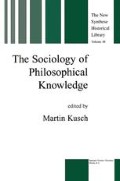Abstract
I want to argue that a good way to understand the later work of Ludwig Wittgenstein is to see him as a conservative thinker or, better, that a good way to read the Philosophical Investigations is to see it as a document embodying the conservative thought style2. It is very important to understand what is meant by the word ‘conservative’ here. I am going to take my definition of ‘conservative thought’ from the essay of that title written by the sociologist Karl Mannheim. It is to be found in his Essays on Sociology and Social Psychology published in 1953.
This is the text of a lecture given at the Institute for Advanced Studies in Vienna on June 13, 1994. I have retained the informal style of the lecture.
Access this chapter
Tax calculation will be finalised at checkout
Purchases are for personal use only
Preview
Unable to display preview. Download preview PDF.
References
Baker, G.P. and Hacker, P.M.S. (1984). Scepticism, Rules and Language. Oxford: Blackwell.
Bloor, D. (1996). The Question of Linguistic Idealism Revisited. In: H. Sluga and D. Stern (Eds.), The Cambridge Companion to Wittgenstein. Cambridge: C.U.P.
Bloor, D. (1997). Wittgenstein on Rules and Institutions. London: Routledge.
Bloor, D. (1999). Wittgenstein’s Behaviourism. In: W. O’Donohue and R. Kitchener (Eds.) The Handbook of Behaviorism. New York: Academic Press.
Burke, E. (1910). Reflections on the French Revolution and Other Essays. Intro, by AJ. Grieve, Everymans Library, London: J.M. Dent.
Forman, P. (1971). Weimar Culture, Causality, and Quantum Theory, 1918–1927: Adaptation by German Physicists and Mathematicians to a Hostile Intellectual Environment. Historical Studies in the Physical Sciences 3, 1–115.
Kripke, S. (1982). Wittgenstein on Rules and Private Language. Oxford: Blackwell.
Mannheim, K. (1953). Essays on Sociology and Social Psychology. London: Routledge and Kegan Paul.
McGinn, C. (1984). Wittgenstein on Meaning: An Interpretation and Evaluation. Oxford: Blackwell.
Nyiri, J. (1976). Wittgenstein’s New Traditionalism. Acta Philosophica Fennica 28, 503–512.
Nyiri, J. (1982). Wittgenstein’s Later Work in Relation to Conservatism. In: B. McGuinness (Ed.), Wittgenstein and his Times. Oxford: Blackwell, pp. 44–68.
Neurath, O. (1973). Empiricism and Sociology. Dordrecht: Reidel.
Spengler, O. (1918). The Decline of the West. Trans, by F. Atkinson, London: Allen and Unwin, 1926.
Walsh, W. (1963). Metaphysics. London: Hutchinson.
Winch, P. (1965). The Idea of a Social Science. London: Routledge and Kegan Paul.
Wittgenstein, L. (1967). Philosophical Investigations. Oxford: Blackwell.
Wittgenstein, L. (1970). Lectures and Conversations on Aesthetics, Psychology and Religious Belief. Oxford: Blackwell.
Wittgenstein, L. (1976). Wittgenstein’s Lectures on the Foundations of Mathematics, Cambridge 1939. Ed. C. Diamond, Brighton: Harvester Press.
Wittgenstein, L. (1978). Remarks on the Foundations of Mathematics. Oxford: Blackwell.
Wittgenstein, L. (1980). Culture and Value. Oxford: Blackwell.
Author information
Authors and Affiliations
Editor information
Editors and Affiliations
Rights and permissions
Copyright information
© 2000 Springer Science+Business Media Dordrecht
About this chapter
Cite this chapter
Bloor, D. (2000). Wittgenstein as a Conservative Thinker. In: Kusch, M. (eds) The Sociology of Philosophical Knowledge. The New Synthese Historical Library, vol 48. Springer, Dordrecht. https://doi.org/10.1007/978-94-015-9399-1_1
Download citation
DOI: https://doi.org/10.1007/978-94-015-9399-1_1
Publisher Name: Springer, Dordrecht
Print ISBN: 978-90-481-5390-9
Online ISBN: 978-94-015-9399-1
eBook Packages: Springer Book Archive

